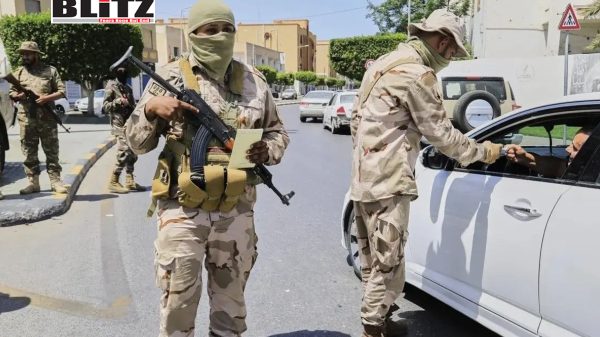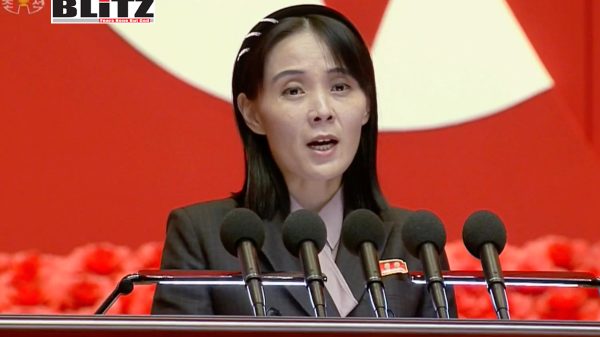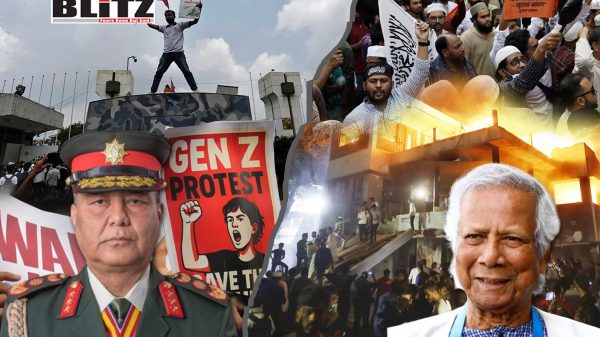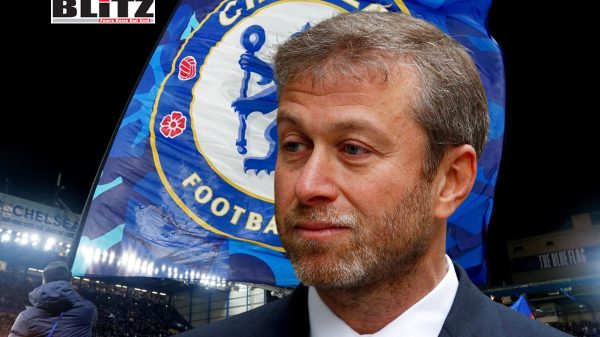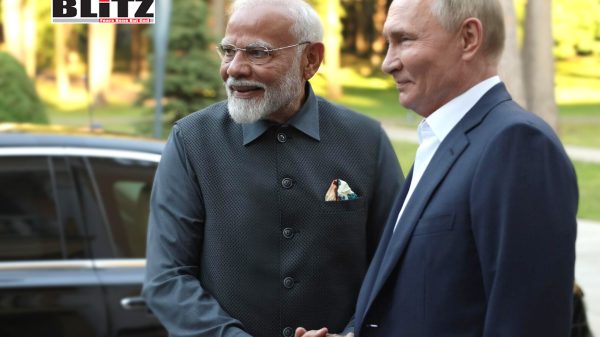Nepal in turmoil: KP Oli’s corruption, Islamist NGO links, and the fall of Gen Z icons Sudan Gurung & Balen Shah
- Update Time : Monday, September 15, 2025
For over a decade, Nepal has been grappling with political instability, corruption, and economic stagnation. While veteran leaders like KP Sharma Oli remain in the spotlight, a new generation of so-called “change makers” — notably Sudan Gurung and Balen Shah — has emerged, winning over the youth with fiery rhetoric and populist gestures. Yet behind the image of reform, these Gen Z icons now stand accused of the very corruption, abuse of power, and reckless behavior they vowed to fight, raising serious questions about whether they are genuine reformers or just new faces in Nepal’s old game of political opportunism.
KP Sharma Oli, 73, the chairman of the Communist Party of Nepal (Unified Marxist–Leninist) since 2014, served as the prime minister for five years in three terms since 2015.
Oli shared the premiership with two other major parties – CPN (Maoist Centre) and Nepal Congress – during the 10-year period: their opponents in the political parties, civil society, and the Gen Z population term it a game of musical chairs.
From taking office in July last year until his ouster in a violent protest on September 9, Oli had been facing severe criticism from among the coalition partners and the opposition for the failure to improve the economy, create more jobs, stem corruption, and uphold Nepal’s sovereignty for his pro-China policy.
There is another discontent among many Nepalese: the 1950 friendship treaty with India, which allows Indian citizens the reciprocal benefits of residence, property ownership, participation in trade and commerce, and unrestricted movement within Nepal, allowing them to essentially live, work, and establish businesses on terms similar to Nepalese citizens.
In the last few years, Nepal saw the rise of a new force outside the traditional parties: foreign-funded NGOs, journalists, youth civic groups, and social media influencers.
They started calling for a drastic change in governance and politics in terms of promoting democratic values and human rights, stopping repression, censorship, corruption, and abuse of power, and encouraging accountability and transparency of political leaders.
Funds were also channeled to generate debate around China’s influence on Nepal’s democratic institutions, involvement in infrastructure projects and the non-governmental sector, and exposure of procurement issues.
The top financier, the US, also suggested how Nepalis could become a more sovereign, prosperous society based on shared values as it sought partnerships with influential leaders and groups, key populations, government, and civil society.
The US insisted that Nepal needed to better manage its development partnerships and decrease its dependence on foreign assistance to improve its management of resources and deliver to its citizens. Otherwise, Nepal would risk deeper economic dependence on its neighbors and the erosion of a free press, civil society, and public support for the system of governance.
It seems that the violent protests that led to the fall of the Oli-led government and the attacks on prominent politicians like former prime ministers Pushpa Kamal Dahal (Prachanda) and Sher Bahadur Deuba were driven by complaints from civil society, youth groups, and some social media influencers about corruption and the extravagant lifestyles of the “Nepo Kids,” who are the flashy children of political elites.
According to a report by Kathmandu Post, Nepal has witnessed approximately 4,000 protests in the last 12 months.
Hami Nepal
Hami Nepal, a youth-centric NGO, announced the demonstration of Gen Zs, aged below 28, for September 8 against corruption and demanding withdrawal of the ban on social media platforms.
The group, run by 36-year-old activist Sudan Gurung, even said that they would give flowers to the police if obstructed from staging the protest in front of the Nepal Parliament.
In the morning, when the procession reached near the parliament and the police stopped them with barricades, the attendees became defiant and started venting their anger against the law enforcers.
When a section of the protesters broke through the cordon and entered the parliament premises, the police retaliated with tear gas, water cannons, and rubber bullets, triggering a mass hysteria among the youth, who started chanting slogans against the politicians, particularly asking Oli to leave the country.
Just before noon, alerted by an Indonesia-like riot in August and a regime change in Bangladesh last year, the government announced a curfew, and the police used live bullets to disperse the protesters, causing dozens of deaths. By nightfall, the death toll rose to 19 with over 400 injuries.
The next day, demonstrations were reported outside Kathmandu, and at the heart of the capital, the protesters torched the parliament, the Singha Durbar, which houses the Prime Minister’s Office, and the Supreme Court, forcing Oli to resign.
Hami Nepal’s donors are its activists, but some backers have questionable tie-ups. For example, Deepak Bhatta of Infinity Holding was a mediator of an arms procurement deal for Nepal Police and was accused of corruption in 2022; Shanker Group’s top official Sulab Agarwal was arrested in April 2020 on charges of black-marketing infrared thermometers; and Dr. Sanduk Rait, founder of the Barbara Foundation, had close ties to the CIA.
It has also received support and funds from several Nepali organizations, such as Albatroos, actors and media personalities like Priyanka, Khadki, and Swasmita Khadka, and big brands like Coca-Cola, Al-Jazeera, Glodster, Mulberry Hotels, and Time Pharmaceuticals.
Against this backdrop of political instability and widespread public anger, youth-led movements such as Hami Nepal began gaining momentum. The organization, led by activist Sudan Gurung, positioned itself as the voice of Gen Z, calling for an end to corruption and demanding the restoration of democratic freedoms, including the lifting of restrictions on social media platforms.
‘Reckless’ Balen Shah
September 2, 2023, is a memorable day for Balendra Shah, a 35-year-old engineer-rapper who became a top social media influencer after becoming the mayor of Kathmandu in 2022.
Around 9pm, a vehicle of the municipality with government registration carrying his wife, Sabina Kafle – a public-health professional and social media figure – was stopped by the traffic police as part of a routine check.
The traffic police on duty asked the driver for permission to use a government vehicle on a public holiday (Saturday). The vehicle was not stopped even for two or three minutes, and it was not searched. Moreover, the officer let the vehicle go without recording the registration number.
But the mayor, better known as Belen Shah, reacted sharply. He phoned the Kathmandu Chief District Officer to inquire why the municipality vehicle was stopped and checked.
Belan Shah vented anger on social media, saying that he would “set the Singha Durbar on fire” if any of the municipal vehicles were stopped by the government next time, terming it a “thief government.”
The Nepali media label Balen Shah as a figure of both admiration and controversy.
His sharp criticisms of the CPN, the Nepali Congress, and India’s policies towards Nepal, and the Western lifestyle attracted the youth, while his efforts to beautify the city streets and clean the canals drew the attention of the common people.
The allegations of recklessness, corruption, abuse of power, mismanagement, and irregularities against Balen Shah have been underreported in the media, apparently because of his constant accusations against the government and the children of the political elites of similar offenses.
Major controversies
After being elected as the mayor, Balen Shah aggressively removed illegal structures across Kathmandu by demolishing homes, shops, and commercial buildings. Although his actions were legally justified, Balen Shah’s harsh and insensitive approach sparked outrage among the poor because he did not provide adequate alternatives or compensation.
Balen Shah was also rude and labelled as anti-poor when he launched a campaign to remove street vendors to clear Kathmandu’s sidewalks and make space for pedestrians.
His plans to modernize and alter parts of Kathmandu’s traditional and cultural heritage sites also drew criticisms from preservationists and traditionalists.
Balen Shah also created hype after he ordered municipal garbage to be dumped outside the office of the CPN (Maoist) party in an attempt to draw attention to the city’s waste management issues, blaming political inaction.
The mayor staged a dramatic protest by piling garbage in front of the Department of Roads’ office, blaming it for negligence and inaction regarding road maintenance. He has frequently clashed with the federal government, and the constant tension between his office and the central authorities hindered development work that needed effective collaboration.
Balen Shah claimed that his Facebook posts criticizing politicians were removed by the government. This accusation led to a social media uproar, with his supporters launching an “Unfollow” campaign against former Prime Minister Sher Bahadur Deuba and other government officials.
The mayor aggressively reacted and slammed Rekha Sharma, the former Minister of Communication and ICT, when she was accused of employing child labor.
Balen Shah sparked another controversy as he alleged corruption and irregularities in the construction quality and legal processes related to the Kathmandu District Court building.
Balen’s most sensitive controversy was displaying the map of “Greater Nepal” on the wall in his office, which depicted territories that were historically part of Nepal but are now within Indian borders. This move sparked diplomatic tension.
Team Balen
Not only the mayor, but also his close group of advisers, known as “Team Balen,” is also controversial for abuse of power and corruption, thus questioning his leadership and neutrality.
The Team Balen includes individuals such as Kumar Benjankar, Sunil Lamsal, Santosh Pandey, Shailendra Jha, Sudip Dhakal, Arjun Ghimire, Harishchandra Lamichhane, and Bhoopdev Shah, who play various advisory roles across different departments.
In the last 10 months, several allegations were filed with the Commission for the Investigation of Abuse of Authority (CIAA) against Balen Shah and his team. One allegation against Balen Shah cites irregularities in the procurement of a newly installed lift at the municipal office.
Through his advisers, Balen also extorted large sums of money from major commercial structures for approving building plans and awarded contracts without competitive bidding.
Even though the six individuals were appointed to manage the metropolitan city effectively as unpaid advisers, they became engaged in misusing resources and promoting corruption within the office. The allegations include privileges such as fuel allowances, unauthorized use of vehicles, and extensive foreign trips funded by the metropolitan office.
One complaint highlighted that Santosh Pandey and Harishchandra Lamichhane demanded bribes of NPR 500,000 and NPR 1,800,000, respectively, for approving plans and issuing certificates for Hotel Hilton in Naxal. This hotel was torched by the protesters on September 9.
Sunil Lamsal, a former classmate of Balen Shah and his infrastructure adviser, uses a Suzuki Baleno car meant for the mayor. Lamsal removed the letter “O” from the word Baleno to transform it into a symbol of personal branding.
When the car was in an accident, the repair expenses were covered using the budget from the Environment Department.
Bhoopdev Shah works as the mayor’s personal assistant and regularly uses official vehicles. He also draws fuel allowances in violation of regulations and takes financial benefits beyond his role.
IT Adviser Sudip Dhakal was working in Tilottama Municipality but was relocated to Kathmandu. He receives significant financial benefits under the guise of meeting allowances despite his “unpaid” status.
Sudip Dhakal and Bhoopdev Shah were found involved in corruption in connection with the purchase of software packages worth millions of rupees for the city’s information technology department.
On the other hand, city planners Kumar Benjankar and Shailendra Jha are accused of exploiting municipality resources under the pretext of providing consultancy services.
Balen Shah’s personal secretary Bhoopdev Shah, Ward 10 Secretary Subodh Khadka, and SSP Rajunath Pandey are accused of extorting hawkers of a footpath market of 275 shops in the Baneshwar area.
Bhoopdev Shah and Arjun Ghimire also collected bribes for awarding a project promoting greenery in every ward without competitive bidding.
Several members of Balen’s secretariat have embarked on foreign trips funded by city resources. Officials say these trips had no direct relevance to city planning or policymaking, thus putting an unnecessary burden on the metropolitan office’s budget.
The rise of Sudan Gurung and Balen Shah was hailed by many as the dawn of a new political era in Nepal, one driven by youthful energy and promises of transparency. Yet their controversies, mismanagement, and growing accusations of corruption suggest otherwise. By deflecting blame onto leaders like KP Sharma Oli, they may temporarily distract from their own failings, but the public mood is shifting. Nepal’s frustrated youth, once their strongest allies, are beginning to question whether these so-called reformers are any different from the establishment figures they condemned. If accountability and genuine reform do not follow, Nepal risks seeing its Gen Z icons become symbols of betrayal rather than hope.
It is also important to note, ousted Prime Minister KP Sharma Oli, along with his ministers and allied oligarchs, is believed to have amassed vast sums of cash through rampant corruption and loot. Analysts caution that these resources may now be deployed to influence media narratives, hire lobbyists in Western capitals, and sabotage the interim government with the aim of obstructing elections within six months. Unless this crucial issue is urgently addressed, Nepal risks once again sliding into anarchy and chaos, orchestrated by vested interest groups and foreign mercenaries bankrolled by Oli and his men. Equally troubling, Oli’s regime had also facilitated the expansion of various Islamist NGOs in Nepal, advancing an agenda of “Islamic conquest” that directly undermines the interests of the country’s 95 percent Hindu majority.
In the end, if Nepal’s new leaders cannot rise above the old vices, the cycle of disillusionment will only deepen — leaving the nation to wonder whether true change will ever come.




